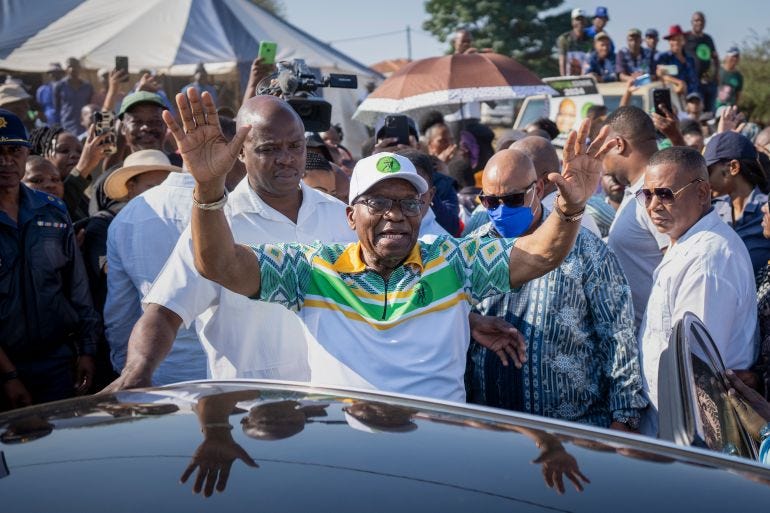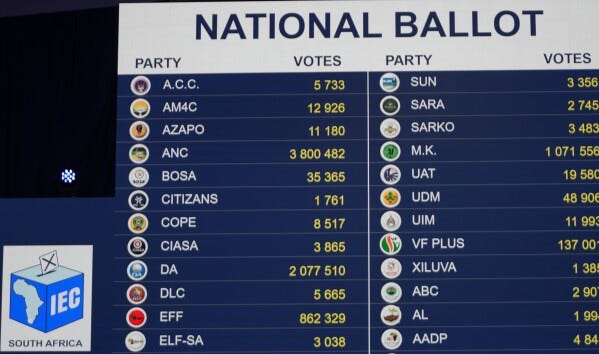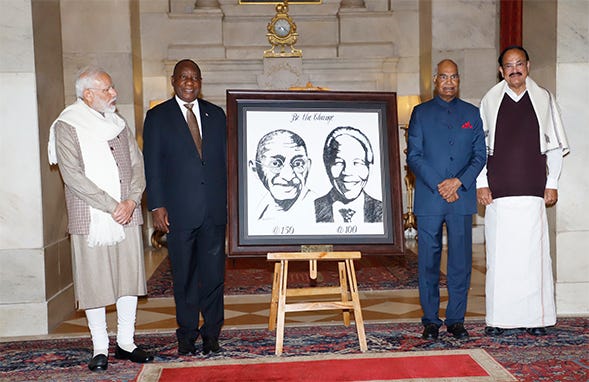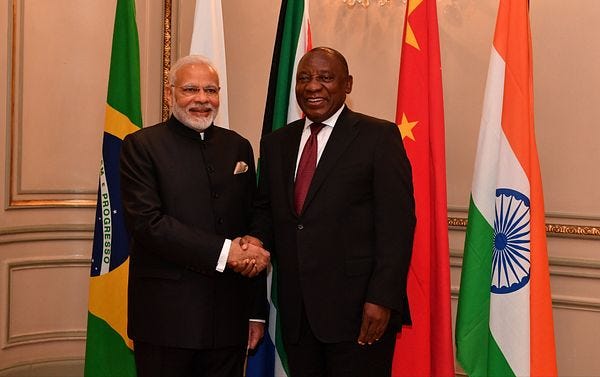South Africa's General Elections: ANC Faces Historic Decline in Popularity
The African National Congress (ANC), Nelson Mandela's party, witnesses a significant erosion in support but may form a coalition government.

A Point of Inflexion in South African Politics
Over the weekend, South Africa witnessed a historic shift in its political landscape as the African National Congress (ANC), the party of the late Nelson Mandela that waged a decades-long struggle against the iniquitous policy of apartheid, experienced a significant erosion in popularity in the general elections. For the first time since the end of apartheid in 1994, the ANC failed to secure a clear parliamentary majority, marking a turning point in the country's democratic journey. Though it may be able to form a coalition government with the assistance of smaller parties and independents, these allies may demand substantial concessions, leading to a significant decline in the new president's powers and political room for manoeuvre.
Election Results and a Split Verdict
With over 99% of the votes counted in the recent South African elections, the African National Congress (ANC) garnered just over 40% of the vote, a dramatic decrease from the 57.5% they received in the 2019 elections. This significant drop has forced the ANC to consider coalition options to maintain its hold on power. The main opposition party, the Democratic Alliance (DA), secured approximately 21% of the vote, making it the second-largest party in the National Assembly. The newly formed uMkhonto we Sizwe (MK) Party, led by former President Jacob Zuma, came in third with just over 14% of the vote, emerging as a significant player in the political arena. The Economic Freedom Fighters (EFF) followed with about 9% of the vote.
Due to the ANC's failure to secure a majority, the party will need to form a coalition government, leading to intense negotiations with other parties, including the DA, MK, and EFF. However, some parties, like the MK, have set conditions for coalition talks, such as the removal of President Cyril Ramaphosa, a demand that ANC has categorically rejected. This situation marks a turning point in South Africa's political landscape, highlighting the challenges of coalition governance and the potential for significant political realignment.
South Africa: Colonial Rule, Apartheid and its End, and Current Economy
Colonial Rule and Apartheid
South Africa's history is marked by a long and complex period of colonial rule, beginning with the establishment of a Dutch settlement in Cape Town by the Dutch East India Company in 1652. This was followed by British colonization in the late 18th and early 19th centuries, leading to significant conflicts with indigenous African groups and the establishment of the Union of South Africa in 1910. The apartheid era, starting in 1948, institutionalized racial segregation and white supremacy, severely restricting the rights and freedoms of the non-white population through a series of oppressive laws.
End of Apartheid
The apartheid regime faced increasing internal resistance and international condemnation, leading to its eventual dismantling in the early 1990s. Under President F.W. de Klerk, apartheid laws were repealed, and Nelson Mandela was released from prison, culminating in the first democratic elections in 1994, which brought Mandela to power as South Africa's first black president.
Current Economic Challenges
Today, South Africa is a democratic nation with a population of approximately 61 million people and an area of 1,221,037 square kilometers. Despite significant progress since the end of apartheid, the country continues to grapple with economic challenges, including high unemployment rates, economic inequality, and infrastructure issues. The economy has been hampered by frequent power cuts, operational failures in freight rail and ports, and high living costs, with GDP growth averaging only 0.8% annually since 2012. The government is focused on structural reforms to improve energy supply, reduce economic barriers, and enhance state capacity to foster sustainable growth.
Factors Contributing to ANC's Decline
The election results reflect widespread dissatisfaction with the ANC's handling of key issues such as economic stagnation, corruption, and service delivery, leading to a significant loss of trust among voters. Several factors contributed to the ANC's diminished support:
Economic Challenges: South Africa faces severe economic issues, including one of the highest unemployment rates globally at 32%. The economic stagnation and profound inequality disproportionately affect the Black majority, eroding support for the ANC.
Corruption Scandals: The ANC has been plagued by numerous corruption scandals, particularly during Jacob Zuma's presidency. These scandals have significantly damaged the party's reputation and trust among the electorate.
Service Delivery Failures: The ANC has struggled to provide basic services such as electricity, clean water, and adequate housing. Frequent power cuts and infrastructure issues have highlighted the government's inefficiencies.
Internal Infighting: The ANC has been beset by internal divisions and infighting, weakening the party's cohesion and effectiveness.
The Path Ahead: Coalition Government
With the ANC falling short of a majority, coalition negotiations are underway. Potential coalition partners include the DA, MK Party, and EFF. However, ideological differences and internal dynamics pose significant challenges to forming a stable government. The ANC must navigate these complexities to maintain its leadership and address the country's pressing issues, to ensure stability, peace and progress.
Coalition Negotiations and Potential Outcomes
Following the recent elections in South Africa, where no party secured a majority, the African National Congress (ANC) is now engaged in coalition talks to form the next government. Despite securing 40.18% of the votes, the ANC lacks the majority needed to govern alone. President Cyril Ramaphosa has called for unity among political parties to form a coalition government. Potential partners include the Democratic Alliance (DA), which received 21.81% of the votes, the uMkhonto we Sizwe (MK) Party, led by former President Jacob Zuma with 14.58% of the votes, and the Economic Freedom Fighters (EFF) with 9.52% of the votes.
Ideological Differences
However, ideological differences, investor concerns, and internal party dynamics pose significant challenges. The ANC-DA coalition is seen as the most stable option, though difficult due to ideological differences. An ANC-MK-EFF coalition could be unstable due to the radical policies of the EFF and MK. The new Parliament must sit and elect a president within 14 days of the election results being declared, adding urgency to the coalition negotiations. The outcome will determine the composition and stability of South Africa's next government.
India-South Africa Relations: A Historical Bond
Deep Historical and Cultural Bonds
India and South Africa share a profound historical connection, significantly shaped by Mahatma Gandhi's early activism in South Africa. Gandhi arrived in South Africa in 1893 and faced racial discrimination, which led him to develop his philosophy of nonviolent resistance, or Satyagraha. A pivotal moment in his life occurred when he was thrown out of a first-class train compartment despite holding a valid ticket in Pietermaritzburg. Gandhi spent 21 years in South Africa, organizing the Indian community against discriminatory laws before returning to India in 1915 to lead the struggle for independence. Nelson Mandela, South Africa's first black president, was greatly inspired by Gandhi's principles of nonviolence and peaceful resistance, which he incorporated into his own fight against apartheid. This shared history of struggle has cemented a lasting bond between the two nations, influencing their diplomatic and cultural relations.
Growing Trade and Multilateral Cooperation
Trade between India and South Africa has grown substantially since the restoration of diplomatic ties in 1993. Bilateral trade increased from $3 million in 1992-1993 to $4 billion in 2005-2006, with a target of $12 billion by 2010. In 2021, South Africa's exports to India included gold, coal briquettes, and raw copper, while India's exports to South Africa comprised vehicles, pharmaceuticals, and machinery. Both countries are working towards a free trade agreement to further enhance economic ties. South Africa remains India's second-largest trading partner in Sub-Saharan Africa, with significant potential for future growth in trade and investment.
Additionally, India and South Africa are active members of multilateral organizations such as BRICS and IBSA, which facilitate cooperation on global issues, including economic development and international security. The inclusion of the African Union as a permanent member of the G20, advocated by India, highlights the strategic partnership between the two nations and underscores their commitment to promoting the interests of developing countries and reforming international institutions to better represent the Global South.
Potential Challenges of the New Coalition Government in South Africa
The recent elections in South Africa have resulted in the African National Congress (ANC) losing its parliamentary majority for the first time since the end of apartheid, necessitating the formation of a coalition government. This presents several potential challenges and key issues that need to be addressed.
Challenges
Ideological Differences: The coalition is likely to include parties with divergent ideologies, such as the pro-business Democratic Alliance (DA) and the left-leaning Economic Freedom Fighters (EFF) and uMkhonto we Sizwe (MK) Party, which advocate for nationalization of key sectors. These ideological differences could lead to conflicts and hinder cohesive policy-making.
Internal Discord and Instability: Historical and ideological differences among coalition members could lead to internal discord and instability. The DA has experienced internal splits and the formation of new parties like ActionSA, complicating coalition dynamics. Constant infighting and brinkmanship could undermine effective governance.
Public Trust and Legitimacy: Declining voter turnout, projected to be as low as 43%, reflects widespread disillusionment with the political system. This low turnout can lead to uneven representation and undermine the legitimacy of the coalition government, making it harder for any party to claim a strong mandate.
Economic Concerns: Business leaders and investors have expressed concerns about the potential economic implications of a coalition involving the EFF and MK Party due to their leftist positions. Ensuring economic stability and attracting foreign investment will be challenging if the coalition cannot present a unified economic policy.
Key Issues to Address
Economic Recovery and Employment: The coalition government must prioritize economic recovery and job creation. South Africa faces severe economic challenges, including high unemployment rates and economic stagnation. Clear and agreed-upon economic objectives will be crucial for the coalition's success.
Corruption and Governance: Addressing institutional corruption and improving governance are critical issues. The ANC's governance has been marred by corruption scandals, and any coalition must commit to transparency and accountability to restore public trust.
Service Delivery: Improving the delivery of basic services such as electricity, water, and housing is essential. Frequent power cuts and inadequate service delivery have been major sources of public dissatisfaction.
Foreign Policy: The coalition will need to navigate foreign policy carefully, especially given South Africa's role in BRICS and its stance on international issues like the Israeli-Palestinian conflict. Aligning foreign policy positions among coalition partners will be necessary to maintain a coherent international stance.
Social Cohesion and Unity: Promoting social cohesion and unity will be important to address the historical and contemporary divisions within South African society. The coalition must work towards inclusive policies that address socioeconomic inequalities and foster national unity.
In summary, the new coalition government in South Africa faces significant challenges, including ideological differences, internal instability, and economic concerns. Addressing key issues such as economic recovery, corruption, service delivery, foreign policy, and social cohesion will be crucial for the coalition's success and the country's stability.
Looking Ahead: A Point of Inflexion
The recent elections in South Africa mark a point of inflexion in the country's democracy. The shift towards coalition governance1 has the potential to check the dominance of any single party, promoting a more balanced and accountable political environment. Despite the challenges, this transition could strengthen South Africa's democratic institutions and reinforce its role as a beacon of hope in the fight against racial discrimination worldwide.
Formation of Historic Coalition in South Africa
In a historic move, South Africa's African National Congress (ANC) has agreed, on 14th June, 2024, to form a coalition government with the Democratic Alliance (DA), its largest rival. This landmark agreement, unprecedented in the country's political history, allowed President Cyril Ramaphosa to secure a second term in office with a resounding 283 votes. The coalition, described as a "government of national unity," signifies a major shift in South African politics, promising a new era of hope and inclusivity as the ANC and DA join forces at the national level for the first time.
Challenges and Future Prospects of the Coalition Government
The coalition between the ANC and DA comes after the ANC lost its majority in the May 29 election, winning only 40% of the vote. Despite this setback, the ANC successfully negotiated a coalition agreement with the DA and other smaller parties. However, this alliance is expected to face challenges due to the differing ideologies of the coalition partners. Some parties, such as the Economic Freedom Fighters and former president Jacob Zuma's MK party, chose not to join the coalition. As Ramaphosa heralded this agreement as a "new birth" for the nation, ongoing negotiations on policies and cabinet positions are anticipated in the coming weeks, highlighting the complexities ahead for this new coalition government.







